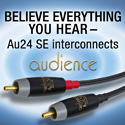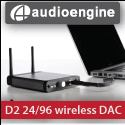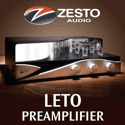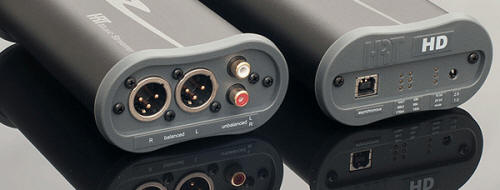|
|
You are reading the older HTML site
Positive Feedback ISSUE 67
hrt Music Streamer HD - A New Reference DAC for the Rest of Us! as reviewed by Tom Gibbs
I first saw the High Resolution Technologies Music Streamer HD over the 2012 holiday season on HRT's Facebook page, where pictures of it were quite prominently placed with very little else in terms of real information other than the occasional teaser. Let's be honest—at that first glance, I was probably already hooked, and, bottom line—I desperately wanted to give it a listen. And mostly based on a couple of included features that offered great appeal to me: the unit handles all bit-rates up to 24/192 via USB (a first at this price point), and it sports balanced as well as single-ended outputs. A real dream of mine of late has been to get back into fully balanced operation, and while that's realistically not on the near horizon (gotta find that affordable, balanced preamp), it's at least great to have the option available. Life is short, I definitely need to start working that angle. Anyway, about the only thing outwardly this little baby didn't seem to offer that even remotely appealed to me is the option for DSD playback, which for me is not a huge issue at the moment—more on that a little later. First of all, a serious rant—I am fully vested in the Windows operating system as my delivery vehicle for computer-based music playback, which is rapidly and increasingly becoming my preferred and almost sole source for music. The convenience factor presented by computer-based audio is nothing short of amazing—I can sit in my listening chair for literally hours on end with nothing more than my preamp's remote and a wireless mouse. It's been truly reeking havoc on my exercise schedule (and my waistline proportions), not to mention my need for occasional sleep—when you've never experienced music playback at this very high level day in and out, it's truly intoxicating, and hard to pull yourself away from! Achieving all this with a Windows-based system is compellingly affordable compared to an entry-level Mac system, and with the Intel processors currently found in all Macs, the differences are much less pronounced between the two operating systems than would have been the case five or so years ago. And this is coming from someone who works on Macs at my real job every day—you'd think, if anything, I'd be much more biased towards the Mac side. The real source of my rant stems from one small consideration: the USB Audio Specification, which currently allows for two levels of performance, USB Audio Class 1, with streaming up to 24/96, and USB Audio Class 2, which allows streaming of music signals up to 24/192. A fact that I have recently become all too familiar with is as follows: while the Mac side has fully embraced the USB audio specification, Windows has remained on the fence, currently only allowing native implementation of USB Audio Class 1. Which really stinks, because here's a potentially world-class unit from HRT with a front panel switch that allows you to easily select between USB Class 1 and Class 2, and all that is needed is a functioning USB Audio Class 2 driver. At this point, the number of manufacturers that have gone the distance and had the appropriate driver developed can be counted on one hand; most notably, they include Wavelength and Centrance, and unfortunately for the rest of us PC users, those drivers are specific to each manufacturers' system. When and if Windows will author their own USB Audio Class 2 universal driver is anybody's guess. I ran into Michael Goodman of Centrance at the recent Axpona 2013 show in Chicago, and I asked him if he had any thoughts on Microsoft's reluctance to author or offer a native USB Audio Class 2 driver. He basically told me that in well in advance of the launch of Windows 8, he approached them and offered to write the code for a native USB Audio Class 2 driver for them totally gratis. Microsoft unceremoniously declined, and matter-of-factly informed him that Windows users weren't concerned with computer audio, they used Windows to run programs like Excel. Really forward thinking, huh? I've had a few exchanges with Kevin Halverson, Chief Technology Officer and lead designer with HRT (also a PC guy, by the way), and he pretty much (at this point) dismisses the need for a Windows universal USB Audio Class 2 driver, because (in his esteemed opinion) the gains of elevating to 24/192 playback are, at best, minimal. And, besides, most capable music players will allow you to fold 24/192 files down to their appropriate multiplier, which in this case is, of course, 24/96—with virtually no detriment to the resultant sound quality. So it's all good, right? I'm not gonna argue with him, especially since I hold so much of his handiwork in such high regard. But not having experienced full-blown 24/192 resolution, I also can't honestly pledge that I concur. To quote that most notable of Atlanta southern belles, Scarlett O'Hara, "With God As My Witness!" I'll eventually get there and find out for myself! Perfect Sound Forever – Finally Realized When CDs and digital playback first started appearing three decades ago, audiophiles took a hard listen and pretty much universally denounced the new format, and at the time, I did agree with them—so many of the music discs that I loved and revered in an analogue format often sounded pretty terrible on CD. Yes, there were serious issues with many of the remastering jobs, but an undercurrent I noted at the time (that didn't get anywhere nearly the press generated by the outcries from the record-buying public) came from audio professionals on the recording industry side; their contention was that the medium and technology wasn't necessarily seriously flawed, the problem was that consumer-based playback equipment just wasn't robust enough to offer the music at studio-quality resolution. I've heard variations of these arguments floating about for seemingly forever, and honestly, only until the last year or so have I had the technology in my system to offer truly, astonishingly good Red Book CD playback. The current crop of digital-to-analogue converters finally offer playback that approaches perfection from PCM-based sources, and the HRT Music Streamer HD sets an impressively high bar for DACs in the under $500 market—it really reaches deep into the encoded bits. I had the opportunity to attend a panel discussion at the Chicago Axpona show that included audio luminaries such as John Atkinson and Jason Serinus of Stereophile, and Robert Harley of The Absolute Sound; the topic of discussion revolved around their personal experiences and how to attract younger listeners into the fold. A very rousing and lively discussion ensued, with a remarkable level of audience participation allowed, but one comment from John Atkinson really hit me. He basically said that Red Book CD was dead, and that the area of real excitement for him was DSD. When they opened the floor for questions, I had the good fortune to get picked, and directed my question to JA. I essentially asked how Red Book level PCM playback could be so easily dismissed, especially now at a time when affordable equipment is finally available for many of us to enjoy it at something approaching full resolution, and there's so very much music available on CD that will probably never be made available (anytime soon) in higher resolution digital formats. He kind of backed off from his previous statement, and even further so when we spoke after the program ended. But I was really surprised by the number of people who came up to me afterward and affirmed to me that they shared my new-found enthusiasm for CD sound reproduced over a good DAC. Listening Results I've always felt that HRT devices did an exemplary job of extracting the most music from less than pristine CD transfers, but the HD takes that legacy into overdrive; it's almost as if they'd enlisted Lance Armstrong to design the circuit with performance enhancement in mind. I can't cite a specific instance of any CD in my collection that I'd ripped to one of my storage drives that didn't sound markedly better through the HD than through anything else I've recently tried. The original Red Book CD issue of Fleetwood Mac's Rumours is a great example: through traditional playback, the music often sounds hard and homogenous, with a great deal of blurring of voices and details—the original CD transfer is, in short, awful. Not so fast—let's examine one of the disc's seminal tracks, "The Chain," which led off side 2 of the original LP. Via the HD, there's a huge increase in the amount of air and delicacy in the acoustic instruments; you can easily pick out the individual guitar positions, and the interplay between Lindsay and Stevie's voices is much more well-defined—shockingly so, to say the least. Mick Fleetwood's kick drum, which previously sounded hard and indistinct now plays with an incredible realism and acoustic power that rhythmically propels the track. Crescendos that previously were just homogenous blurrings of loud sounds are just as loud, but you can actually identify the individual parties and their instruments, and shockingly absent is anything remotely resembling the digital fatigue that I'd previously always identified with this disc. I probably hadn't listened to this disc more than a couple of times over the last twenty years, and I've listened to it with sheer pleasure repeatedly over the last few weeks. Recently I was at my brother's house scouring his CD shelves looking for anything that I might not have noticed on the last trip and came across Jennifer Warnes' 2001 release The Well, a disc that I'd heard a couple of tracks from a few years earlier but didn't really dig too deeply into. I'd signed up for a trial membership to an mp3 download site that came with 50 free downloads, and among the ones I chose were a couple of songs from both The Well and Famous Blue Raincoat, her disc of Leonard Cohen songs. Those mp3s ended up on the flash drive that I use with my car stereo and usually turn up in the rotation every couple of months or so over the last few years, but for whatever reason never really sparked enough interest in me to pursue the full discs. And besides, I usually stay away from records that have been typified as "audiophile" recordings—I mean, just about every issue of TAS or Stereophile you pick up has an ad from Acoustic Sounds or Elusive Disc featuring either or both albums in expensive LP or Japanese CD versions. One listen to my rip of the title track "The Well" really grabbed me, and I sat in almost utter disbelief while the entire album played through—I just couldn't fathom how my peripheral involvement with this music in the car did nothing for me, but inside the house through the Music Streamer HD, I was really touched by the excellent performances, and this disc is just brimming with them. Of course, at that moment, I realized that I had to get a copy of Famous Blue Raincoat, which is—just my luck—out of print, dammit! Trips to Ebay and Amazon revealed sealed and used copies of the 2007 Twentieth Anniversary reissue priced anywhere from around $100—way too rich for my blood. I finally found a vendor in Cincinnati—Used Kids Records—that had a $12 copy of the original 1989 CD issue in "good" condition that took about two weeks to arrive. A quick listen to the CD "straight up" revealed that the disc sounded dynamically constricted with screechy vocals—this one might prove a real challenge for the HD. No worries—the HD offered my rip of the Private Music original with body, depth of soundstage and liquid vocals and midrange all perfectly intact. Stevie Ray Vaughan's searing guitar turn on "First We Take Manhattan" totally rocks the house, and Leonard Cohen's guest appearance on "Joan of Arc" finds him in incredibly excellent voice. The tom-tom beat that opens the balls-out version of "Bird On A Wire" shakes the house—Judy Collins' 1975 steel guitar-laced countrified version seems rather tame by comparison. I'll have to eat some serious crow and back off my posturing with regards to so called "audiophile" records—Jennifer Warnes is without a doubt one of the great interpreters of Leonard Cohen's music. This is an album you can sit and listen to repeatedly with no wear for the worse—J. Gordon Holt would not approve! I've always had a deep connection with prog-rock, and one of my all-time favorite albums is Yes' classic Close To The Edge, which was recently made available on HD Tracks in 24/96 and 24/192 downloads. Woo hoo! I decided with a certain amount of trepidation to go for the 24/192 version, just to see how the Streamer HD and JRiver Media Center handled the down conversion to 24/96. At the very worst, I'd at least have the higher-res files available at the point when I finally do have 24/192 capability, even though it totally miffs me that HRT hasn't released a USB Class 2 driver for us Windows users. The good news is that Close To The Edge sounds impressively good; even down sampled, it's easily the best sounding digital version of this music I've yet heard—it possesses an ease and clarity that really rivals the analog original. I'm not ready to throw in the towel and agree with Kevin Halverson quite yet about the lack of ill effects from the down conversion process—I still want to hear this music at full resolution, even as good as it sounds at 24/96. And those experiences are emblematic of my complete experience with the Music Streamer HD – through it, everything just sounds more like music. Seriously, the level of enjoyment I've gotten from the HD makes any of my bitching at the onset of this review seem downright petty—heck, 16/44.1 might just be enough! I really can appreciate why they chose to name this device the HD—HD for High Definition, of course—because I've been getting the musical equivalent of crisp and clear 1080p with everything I listen to. In Conclusion There are so many aspects of the Music Streamer HD that I didn't have the opportunity to explore; I didn't have the correct setup to confirm the superiority of either balanced or 24/192 file playback, but even just via single-ended outputs the HD sounds pretty damned amazing. How does it compare to HRT's previous offerings? Well, the MS II+ was a definite step up from the baseline Music Streamer, and the HD takes a serious leap forward in performance from the II+ for a mere hundred dollars more. I did some serious A/Bing between the II+ and the HD, and I'm still greatly impressed with what the II+ brings to the table for only $349, offering the kind of warmth and retrieval of detail I'd never have believed possible at that price level. The HD shares a similar sonic signature with the II+, but takes you even more deeply into the music, casting a larger, more convincing soundstage, with exemplary detail retrieval—I could live with this unit as is and be perfectly happy never having tasted any of its expanded capabilities. The Music Streamer HD is, at this point, HRT's magnum opus—the true culmination of their art. They say you can't make a silk purse out of a sow's ear, but I'm honestly not so sure anymore; the ability of this device to find nuance and fine detail from the sow's ear CDs I'd previously considered borderline unlistenable is just remarkable, and the really good discs are off-the-charts great! The HD doesn't do DSD, but let's face it—DSD, at this point anyway is a rich man's game. The average Joe isn't going to spring for the comparatively elevated cost of DSD downloads, and he probably isn't sufficiently tech-savvy to create his own DSD rips from SACDs. The least expensive DSD-capable DAC currently on the market is around $1000, and that entry-level price point is probably never going to dip into the sub-$500 market anytime in the foreseeable future, if ever. DSD is probably always going to be a niche market. Contrast that with the vast availability of PCM-based Red Book CDs out there and the growing number of reasonably affordable 16- and 24-bit digital downloads. Does PCM sound as great as DSD? Not currently. But in a well-implemented PCM-based system, the differences are becoming shockingly much less obvious, with music resulting that is much more difficult to distinguish from the analogue originals. And with a really great, affordable DAC like the Music Streamer HD, more of us can actually embrace sound that approaches the absolute. Late Breaking News! I regularly check HRT's website for firmware and software updates, and they've just posted a new disclaimer on the HD's main page to the effect that they're working on a 24/192 usb driver solution for PC users and will make it available as soon as it's ready! This is seriously good news, and let me tell you, the only thing that kept me from buying the review sample was my desire to experience higher-resolution USB audio on my PC. I decided I'd hold off from purchasing until I could get everything I wanted at a price point within my comfort zone—now I'm kicking myself that I didn't go ahead and pull the trigger! The Music Streamer HD is a world-class DAC at any price point, and now there's no reason whatsoever for PC users to hesitate! Tom Gibbs
Music
Streamer HD
High
Resolution Technologies
|








